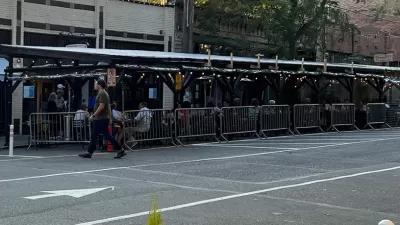Allison Arieff tells the sordid tale of a "modestly modernist" house in Oakwood, a historic district in Raleigh, North Carolina. Despite the fully permitted house being 85 percent complete, a lawsuit by a neighbor could force its demolition.

In examining the example of the lawsuit over the construction, and subsequent legal controversy, of a modernist house in a historic neighborhood in Raleigh, Arieff, writing for the New York Times, asks a troubling question: "should a difference in taste lead to a court date?
The back story:
"In September, Louis Cherry, an architect here, received a building permit and the necessary approvals to begin constructing a house for himself and his wife, Marsha Gordon, on an empty lot in Oakwood, a historic district in Raleigh. The neighborhood features a variety of architectural styles, from postwar bungalows to Greek Revivals, shotguns to Queen Annes. Construction began in October and the home, modern but modestly so, is nearly complete."
However, "[through] a series of protracted appeals, the neighbor has been successful in getting the city to reverse its approval of Mr. Cherry’s permit. The house passed its building inspections and is 85 percent complete, yet sits empty, its future dependent on who finally wins a legal battle that never should have been allowed to happen."
The implications of the case include a loss of individual freedom for the making of one's home, but Arieff also discusses the implications (read: "black eye") of the court case for the preferred methods of historic preservation. For the record, Preservation North Carolina has publically opposed the lawsuit.
FULL STORY: Don’t Like Your Neighbors’ House? Sue Them.

Alabama: Trump Terminates Settlements for Black Communities Harmed By Raw Sewage
Trump deemed the landmark civil rights agreement “illegal DEI and environmental justice policy.”

Planetizen Federal Action Tracker
A weekly monitor of how Trump’s orders and actions are impacting planners and planning in America.

Why Should We Subsidize Public Transportation?
Many public transit agencies face financial stress due to rising costs, declining fare revenue, and declining subsidies. Transit advocates must provide a strong business case for increasing public transit funding.

Understanding Road Diets
An explainer from Momentum highlights the advantages of reducing vehicle lanes in favor of more bike, transit, and pedestrian infrastructure.

New California Law Regulates Warehouse Pollution
A new law tightens building and emissions regulations for large distribution warehouses to mitigate air pollution and traffic in surrounding communities.

Phoenix Announces Opening Date for Light Rail Extension
The South Central extension will connect South Phoenix to downtown and other major hubs starting on June 7.
Urban Design for Planners 1: Software Tools
This six-course series explores essential urban design concepts using open source software and equips planners with the tools they need to participate fully in the urban design process.
Planning for Universal Design
Learn the tools for implementing Universal Design in planning regulations.
Caltrans
Smith Gee Studio
Institute for Housing and Urban Development Studies (IHS)
City of Grandview
Harvard GSD Executive Education
Toledo-Lucas County Plan Commissions
Salt Lake City
NYU Wagner Graduate School of Public Service





























